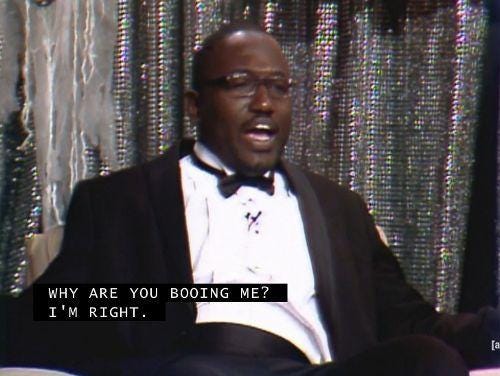1
Or, Knowing Things
You've probably seen the MFA blog post already. It...reignited some conversations that have been going on a while (on Twitter, especially, which can feel like the water cooler of the writing world) so that many takes felt familiar. I'm a reader, not a writer, so what I'm about to say comes from that place - there is such a thing as MFA writing. If one reads enough books out of the US, especially literary fiction, they have experienced it.
For me, a reader who's never lived in or visited the US; what this makes me think of is how, as we say in Kenya, the US straddles the global literary scene like a colossus. What would be a conversation among folks in one country (small, by some measures) becomes a larger one about the state of Anglophone literature. This is the same month where someone tweeted that some MFA programmes won't accept genre writers because they don't think they have the range to instruct them - meaning that the MFA disc horse is ridiculously niche.
What does it look like to de-centre the US? The recent run of African writers winning literary prizes has Alex Clark in the Guardian considering this rise and the fact that the (we can say it here) mostly white Western establishment remains, well, white (see: recent figures from Penguin Random House) and classed a certain way. While some prizes are British (oh, Britannia!), the US looms large still. And we haven't even spoken about the profiles of the African writers who attract prize attention.
Thinking out loud etc. Get an MFA if you want - and I'd love to have an African who has an MFA come on the podcast to speak about how that has shaped their process.
Speaking of the league of the MFA-ed: Ndinda Kioko is on the latest episode of the 100 on Books podcast (what remove! Say *my podcast*!) talking to Deesha Philyaw. This was one of those times when I, a potato, felt the power of ✨manifesting✨ because Mama Mike (aka my mother) thought Deesha would be a great guest. Now, I want the record to show that I *am* like the other girls - I am in awe of both these writers and didn't think a conversation would happen. So I handed the reins to Ndinda and spent the time being starry-eyed. Good times were had by all :)
Another thing I've been thinking about lately? Sex (*cue Salt-N-Pepa’s 'Let's Talk About Sex'*)
Jokes aside, so much literary fiction sex is dry.
I've recently found myself in multiple conversations about sex in litfic and...Maina let me tell you something... The romance girlies are the only ones giving us what's what (and not always, I'm looking at you Team Fade To Black) and I don't know what happens when folks who write certain literature consider sex. Why is it so weird TO ME?! Urgh. Anyway, I've gone on about this enough on Twitter but there is a way to be lyrical and evocative and all that about sex without being so cringe (yeah, I said it).
Lastly (breathlessly, as the Pomodoro winds down); this last weekend might have been my most bookish yet. I finished The Empathy Exams by Leslie Jamison and Sugar Town Queens by Malla Nunn, made progress with My Heart Is A Chainsaw and Gathoni Kinuthia (who hosts THE BEST bookish Twitter Spaces - follow her!) sent me the anthology in which her story is featured, Broken Rhythm. Plus I picked up 2 books at Text Book Centre (The Way We Eat Now by Bee Wilson and The Lost Properties Of Love by Sophie Ratcliffe) from a 400/- sale table (we love deals!) and read by the pool. Aaah, good times.
I hope you have a great week and a lovely time reading. Talk to you soon!




It gets better by the week. Having listened to Deesha Philyaw and Ndinda Kioko on 100 on Books, I am currently rereading Deesha Philyaw's " The Secret Lives of Church Ladies ". I have savoured each story, now under brand new lenses. I tell you, I just love it!